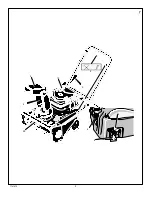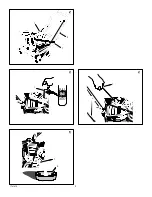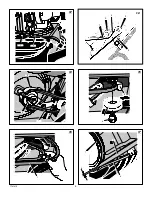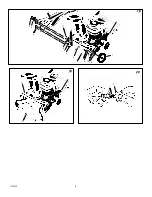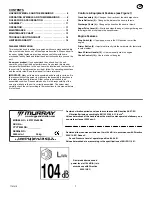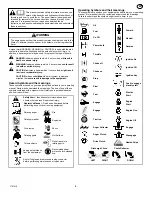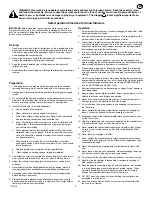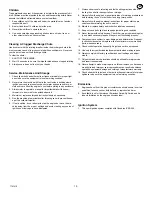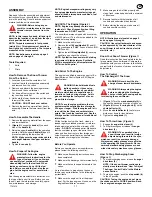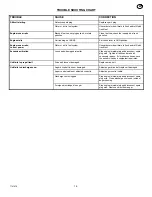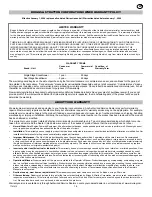
en
12
1741413
How To Move Forward
(Figure 7)
1. Hold the
auger drive lever (5)
against the
handle (2).
The auger will begin rotating.
2. To go forward, raise the
handle (2)
to allow
the rubber auger blades to contact the
ground. Maintain a firm hold on the
handle
(2)
as the snow thrower starts to move for-
ward. Guide the snow thrower by moving the
handle (2)
either left or right. Do not attempt
to push the snow thrower.
3. To stop, release the
auger drive lever (5)
.
NOTE: If the auger continues to rotate, see
“How To Adjust The Auger Control Cable” in
the Maintenance section.
Before Starting The Engine
1. Before you service or start the engine, famil-
iarize yourself with the snow thrower. Be
sure you understand the function and loca-
tion of all controls.
2. Make sure that all fasteners are tight.
3. Make sure gas tank is filled properly with
clean, fresh, unleaded petrol with a minimum
of 85 octane.
4. Become familiar with the location of all con-
trols and understand their function.
5. Before starting the engine, make sure all
controls operate corrently.
How To Stop The Engine
(Figure 1)
To stop the engine, push the
stop switch (8)
to
the off position.
CAUTION: To stop the engine, do not move
the choke control to CHOKE position. Back-
fire or engine damage can occur.
How To Start The Engine
(Figure 1)
Make sure that the engine oil is at FULL mark on
dipstick. The engine is equipped with a recoil
starter. Before starting the engine, make certain
that you have read the following information.
If engine floods, set the choke to the OPEN/
RUN position and crank until the engine starts.
WARNING: Rapid retraction of the
starter cord (kickback) will pull
your hand or arm toward the en-
gine faster than you can let go of the start-
er cord.
S
When starting the engine, slowly pull
the starter cord until resistance is felt.
Then, rapidly pull the starter cord.
S
Make sure components; such as impel-
lors, pulleys or sprockets, are securely
attached.
How To Start A Cold Engine
(Figure 1)
1.
(Figure 1)
Push the
stop switch (8)
to the
ON position.
2. When starting the engine, do not engage the
auger drive lever.
3. Move the
choke control (14)
to the FULL
choke position.
4. Push the
primer button (9)
two times. Re-
move finger from the
primer button (9)
be-
tween primes.
5.
(Figure 4)
Slowly pull the
recoil starter han-
dle (1)
until resistance is felt and then pull
rapidly to start the engine. Do not allow the
recoil starter handle (1)
to snap back. Slow-
ly return the
recoil starter handle (1).
NOTE: In temperatures below 0
q
F, allow
the engine to warm up for several minutes
before blowing snow.
WARNING: Never run the engine
indoors or in enclosed, poorly ven-
tilated areas. Engine exhaust con-
tains carbon monoxide, an odorless and
deadly gas. Keep hands, feet, hair and
loose clothing away from any moving parts
located on the engine or the snow thrower.
The temperature of muffler and nearby
areas may exceed 150
q
F. Avoid these
areas.
How To Start A Warm Engine
(Figure 1)
If an engine has been running and is still warm,
leave the
choke control (14)
in the off position
and do not push the
primer button (9)
. If the
engine fails to start, follow the instructions “How
To Start A Cold Engine”.
NOTE: Do not use the primer button (9) to
start a warm engine.
How To Start An Engine With A Frozen Electric
Starter
(Figure 1)
If the starter is frozen and will not turn the en-
gine, follow the instructions below.
1. Pull out the
recoil starter handle (12)
as far
as possible.
2. Quickly release the
recoil starter handle
(12)
. Allow the
recoil starter handle (12)
to
snap back against the recoil starter.
If the engine still fails to start, repeat the two pre-
vious steps until the engine starts. Then, contin-
ue with the directions “How To Start A Cold
Engine”.
To help prevent the possible freeze--up of the
recoil starter and of the engine controls, proceed
as follows after each snow removal job.
1. Before storing, run the snow thrower a few
minutes to prevent freeze--up of the auger/
impeller.
2. With engine off, allow engine to cool for sev-
eral minutes.
3. Pull starter rope very slowly until resistance
is felt, then stop. Allow the starter rope to re-
coil. Repeat three times.
4. With the engine not running, wipe all snow
and moisture from the carburetor cover in
area of controls and levers. Also, move the
choke control and starter handle several
times.
How To Remove Snow or Debris From
The Auger Housing
(Figure 1)
WARNING: Do not attempt to re-
move snow or debris that may be-
come lodged in auger housing
without taking the following precautions.
1. Release the
auger drive lever (5)
.
2. To stop the engine, move the
stop switch
(8)
to the stop position.
3. Disconnect the spark plug wire.
4. Do not place your hands in the
auger hous-
ing (22)
or the
discharge chute (4)
. Use a
pry bar to remove any snow or debris.
Snow Throwing Tips
1. This snow thrower will propel itself forward
when the handle is raised enough to cause
the auger blades to contact the ground. The
auger should stop when auger control bar is
released. If it does not stop, see “How To Ad-
just The Auger Control Cable” in the adjust-
ment section.
2. Most efficient snow throwing is accomplished
when the snow is removed immediately after
if falls.
CAUTION:
Do not overload the machine ca-
pacity by attempting to clear snow at too fast
a rate.
3. For complete snow removal, slightly overlap
each previous path.
4. Whenever possible, discharge the snow
down wind.
5. The distance the snow will be discharged
can be adjusted by moving the discharge
chute deflector. Raise the deflector for more
distance or lower the deflector for less dis-
tance.
6. In windy conditions, lower the chute deflector
to direct the discharged snow close to the
ground where it is less likely to blow into un-
wanted areas.
7. For safety and to prevent damage to the
snow thrower, keep the area to be cleared
free of stones, toys and other foreign objects.
8. Do not use the auger propelling feature when
clearing gravel or crushed rock driveways.
Move the handle down to slightly raise the
auger.
9. The forward speed of the snow thrower is
dependent on the depth and weight of the
snow. Experience will establish the most ef-
fective method of using the snow thrower un-
der different conditions.
10. After each snow throwing job, allow the en-
gine to run for a few minutes. The snow and
accumulated ice will melt off the engine.
11. Clean the snow thrower after each use.
12. Remove ice, snow and debris from the entire
snow thrower. Flush with water to remove all
salt or other chemicals. Wipe snow thrower
dry.
Dry And Average Snow
1. Snow up to eight inches deep can be re-
moved rapidly and easily by walking at a
moderate rate. For snow or drifts of a greater
depth,slow your pace to allow the discharge
chute to dispose of the snow as rapidly as
the auger receives the snow.
2. Plan to have the snow discharged in the di-
rection the wind is blowing.
Wet Packed Snow
Move slowly into wet, packed snow. If the wet,
packed snow causes the auger to slow down or
the discharge chute begins to clog, back off and
begin a series of short back and forth jabs into
the snow. These short back and forth jabs, four
to six inches, will “belch” the snow from the
chute.
Snow Banks And Drifts
In snow of greater depth than the unit, use the
same “jabbing” technique described above. Turn
the discharge chute away from the snow bank.
More time will be required to remove snow of
this type than level snow.
Содержание 6210701X54N
Страница 2: ...2 1741413 2 3 5 8 12 9 4 14 1 22 ...
Страница 3: ...3 1741413 2 1 1 2 3 x 1 4 1 x 5 1 2 ...
Страница 4: ...4 1741413 1 2 2 6 1 7 5 2 1 7 8 9 1 1 1 1 1 2 2 2 2 2 4 3 10 2 3 1 4 4 5 11 3 4 ...
Страница 5: ...5 1741413 1 2 12 13 1 2 3 4 4 1 3 14 2 4 5 6 15 1 16 1 7 9 8 17 ...
Страница 6: ...6 1741413 1 7 6 18 3 4 4 5 2 2 2 2 8 9 9 1010 11 19 11 6 20 1 2 ...
Страница 194: ...194 1741413 ...
Страница 205: ...205 1741413 ...
Страница 206: ...206 1741413 ...


